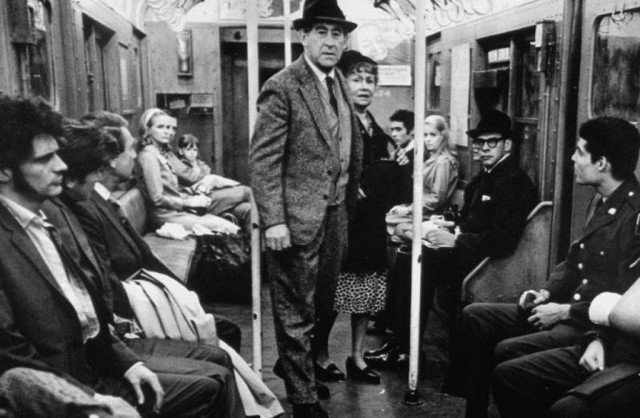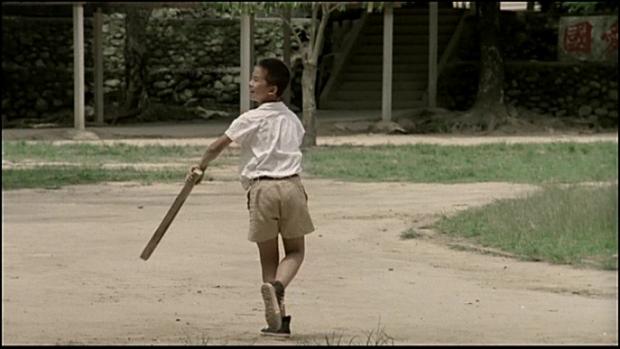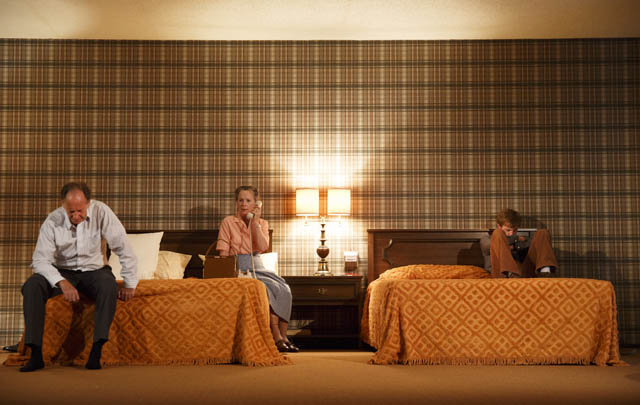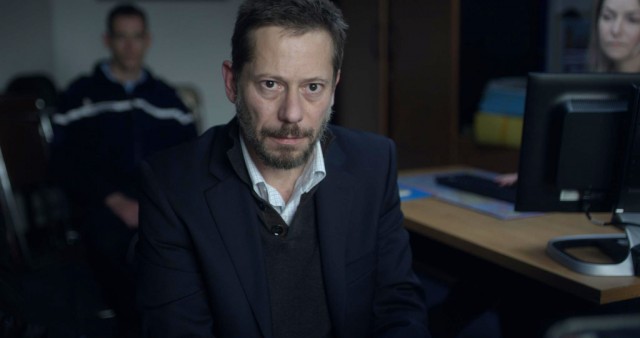
Ron “Stray Dog” Hall takes his wife, and viewers, on a marvelous ride into the heart of America in Debra Granik’s charming documentary
STRAY DOG (Debra Granik, 2014)
Film Society of Lincoln Center
Thursday, October 2, Francesca Beale Theater, 7:30
Friday, October 3, Howard Gilman Theater, 6:15
Encore screening: Sunday, October 12, Walter Reade Theater, 2:30
Festival runs September 26 – October 12
212-875-5050
www.filmlinc.com
www.straydogthemovie.com
 Shortly after meeting Ron “Stray Dog” Hall at the Biker Church in Branson, Missouri, writer-director Debra Granik (Down to the Bone) cast the Vietnam vet as Thump Milton in her second feature, the Oscar-nominated Winter’s Bone. Upon learning more about him, she soon decided that he would be a great subject for a documentary, so she took to the road, following him across the country in the engaging and revealing Stray Dog. Nearly always dressed in black, including his treasured leather jacket covered in medals and patches — when he puts it in a suitcase for a trip, it’s a ritual like he’s folding the American flag — Hall is a wonderfully grizzled old man with a fluffy white beard. At home, he is learning Spanish online so he can communicate better with his new wife, Alicia, a Mexican immigrant, and her two sons (who still live across the border). He visits with his teenage granddaughter, who is making some questionable decisions about her future. In Missouri, he owns and operates the At Ease RV Park, where he gives breaks to fellow vets who can’t always afford to pay the rent. And when he goes on the road, participating in the Run for the Wall, joining up with thousands of other bikers heading for the annual service at the Vietnam Veterans Memorial in Washington, DC, he stops along the way at other ceremonies honoring soldiers who have gone missing, are POWs, or were killed in action in Vietnam, Iraq, Afghanistan, and other wars.
Shortly after meeting Ron “Stray Dog” Hall at the Biker Church in Branson, Missouri, writer-director Debra Granik (Down to the Bone) cast the Vietnam vet as Thump Milton in her second feature, the Oscar-nominated Winter’s Bone. Upon learning more about him, she soon decided that he would be a great subject for a documentary, so she took to the road, following him across the country in the engaging and revealing Stray Dog. Nearly always dressed in black, including his treasured leather jacket covered in medals and patches — when he puts it in a suitcase for a trip, it’s a ritual like he’s folding the American flag — Hall is a wonderfully grizzled old man with a fluffy white beard. At home, he is learning Spanish online so he can communicate better with his new wife, Alicia, a Mexican immigrant, and her two sons (who still live across the border). He visits with his teenage granddaughter, who is making some questionable decisions about her future. In Missouri, he owns and operates the At Ease RV Park, where he gives breaks to fellow vets who can’t always afford to pay the rent. And when he goes on the road, participating in the Run for the Wall, joining up with thousands of other bikers heading for the annual service at the Vietnam Veterans Memorial in Washington, DC, he stops along the way at other ceremonies honoring soldiers who have gone missing, are POWs, or were killed in action in Vietnam, Iraq, Afghanistan, and other wars.
Hall is a gregarious, gentle man who people instantly flock to and gather around — a scene in which two of his cats sit on each of his knees is absolutely heartwarming — but he is also haunted by some of the things he did in Vietnam, suffering from nightmares that sometimes have him screaming out loud while sleeping in bed. And he wears one of his mottoes right on his arm: “Never Forgive Never Forget.” At one point he sits comfortably on a couch and says, “Just kind of being free, don’t hurt nobody, do what you want to do — a nice thing, ain’t it? You know, I’d rather live as a free man for a year than a slave for twenty.” Granik simply follows Hall as he experiences life with his surprisingly refreshing point of view; no one ever turns to the camera to make any confessions, and no talking heads are brought on board to evaluate what we’re seeing. Granik just lets this beautiful piece of Americana unfold at its own pace while also touching on such hot-button topics as immigration reform, gun control, the economic crisis, and PTSD, making no judgments as we follow the captivating exploits of a man who is part Buddha, part Santa, and all patriot. Stray Dog is making its New York premiere October 2-3 at the 52nd New York Film Festival, with Granik participating in Q&As following each screening. [Ed. note: An encore screening has been added for Sunday, October 12, at 2:30 at the Walter Reade Theater.]


 Hou Hsiao-hsien’s Taiwanese New Wave masterpiece, A Time to Live, a Time to Die, is a bittersweet, nostalgic look back at his childhood, after his father’s government job moves the family from Mainland China just as the Cultural Revolution is taking effect. The semiautobiographical film is seen through the eyes of young Ah-ha (You Anshun) as his father (Tien Feng) suffers ill health, his older brother gets harassed by a local gang, his mother (Mei Fang) tries to maintain the household, and his grandmother (Tang Ju-yun) keeps getting lost, being brought back by rickshaw drivers who demand ever-larger payments. The family lives in a Japanese-style home that is beautifully photographed by cinematographer Mark Lee Ping-bing, with Hou favoring long shots with limited camera movement, calmly shifting from scene to scene as Ah-ha grows up into a teenager (Hsiao Ai) and discovers a whole new set of problems and reality. The middle film in Hou’s coming-of-age trilogy (in between 1984’s A Summer at Grandpa’s and 1986’s Dust in the Wind), A Time to Live is a deeply personal, intimate, unforgettable story of life, death, and the bonds of family. The film is screening October 3 at 7:00 as part of the Museum of the Moving Image series “Also like Life,” which continues through October 17 with such other Hou works as Daughter of the Nile, Dust in the Wind, The Sandwich Man, and A City of Sadness as well as such related films as Chen Kun-hou’s Growing Up and Jia Zhangke’s I Wish I Knew.
Hou Hsiao-hsien’s Taiwanese New Wave masterpiece, A Time to Live, a Time to Die, is a bittersweet, nostalgic look back at his childhood, after his father’s government job moves the family from Mainland China just as the Cultural Revolution is taking effect. The semiautobiographical film is seen through the eyes of young Ah-ha (You Anshun) as his father (Tien Feng) suffers ill health, his older brother gets harassed by a local gang, his mother (Mei Fang) tries to maintain the household, and his grandmother (Tang Ju-yun) keeps getting lost, being brought back by rickshaw drivers who demand ever-larger payments. The family lives in a Japanese-style home that is beautifully photographed by cinematographer Mark Lee Ping-bing, with Hou favoring long shots with limited camera movement, calmly shifting from scene to scene as Ah-ha grows up into a teenager (Hsiao Ai) and discovers a whole new set of problems and reality. The middle film in Hou’s coming-of-age trilogy (in between 1984’s A Summer at Grandpa’s and 1986’s Dust in the Wind), A Time to Live is a deeply personal, intimate, unforgettable story of life, death, and the bonds of family. The film is screening October 3 at 7:00 as part of the Museum of the Moving Image series “Also like Life,” which continues through October 17 with such other Hou works as Daughter of the Nile, Dust in the Wind, The Sandwich Man, and A City of Sadness as well as such related films as Chen Kun-hou’s Growing Up and Jia Zhangke’s I Wish I Knew.




 Real-life partners Mathieu Amalric and Stéphanie Cléau strip Georges Simenon’s short 1955 novel The Blue Room to its bare essentials — and we do mean bare — in their intimate, claustrophobic modern noir adaptation, which makes its North American premiere at the New York Film Festival September 29 and 30. In addition to being one of the world’s most talented actors, starring in such films as Kings and Queen, The Diving Bell and the Butterfly, A Christmas Tale, and
Real-life partners Mathieu Amalric and Stéphanie Cléau strip Georges Simenon’s short 1955 novel The Blue Room to its bare essentials — and we do mean bare — in their intimate, claustrophobic modern noir adaptation, which makes its North American premiere at the New York Film Festival September 29 and 30. In addition to being one of the world’s most talented actors, starring in such films as Kings and Queen, The Diving Bell and the Butterfly, A Christmas Tale, and